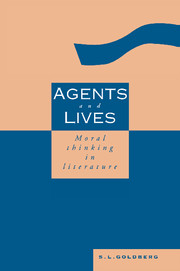Book contents
- Frontmatter
- Contents
- Acknowledgments
- Preface
- 1 ‘Perpetually moralists’ … ‘in a large sense’
- 2 ‘How to live’ and ‘how to live’
- 3 Agents and lives: making moral sense of people
- 4 ‘Doing good to others’: some reflections on Daniel Deronda
- 5 Moral thinking in The Mill on the Floss
- 6 Finding congenial matter: Pope and the art of life
- 7 Literary judgment: making moral sense of poems
- 8 Afterword: some limits of philosophy?
- Notes
- Index
3 - Agents and lives: making moral sense of people
Published online by Cambridge University Press: 19 January 2010
- Frontmatter
- Contents
- Acknowledgments
- Preface
- 1 ‘Perpetually moralists’ … ‘in a large sense’
- 2 ‘How to live’ and ‘how to live’
- 3 Agents and lives: making moral sense of people
- 4 ‘Doing good to others’: some reflections on Daniel Deronda
- 5 Moral thinking in The Mill on the Floss
- 6 Finding congenial matter: Pope and the art of life
- 7 Literary judgment: making moral sense of poems
- 8 Afterword: some limits of philosophy?
- Notes
- Index
Summary
My basic contention is that imaginative literature has traditionally been, and still is, a distinctive and irreplaceable form of moral thinking. Compared with philosophy in its various branches, or history, or psychology, or biography, or any combination of the ‘moral sciences’, it has a unique capacity to look at human experience with, as it were, stereoscopic moral vision. Literature does not necessarily have to do so, perhaps, but on the whole it has, and in many literary modes and genres and forms, not just those that might be called ‘realistic’. But by ‘stereoscopic moral vision’ (to repeat the point once again), I do not mean seeing or trying to see human experience, or ‘criticizing life’, by the light of two different codes of morality (for example, Adam's action is wrong/Adam's action is right), but rather combining, so long as it is not confusing, two different but equally needed ways of thinking about human experience and evaluating it (for example, Adam's action is wrong/Adam's action shows him to be (among other things) loving, and noble in his loving).
To put it baldly, I think that the moral thinking characteristic of imaginative literature can proceed, if a work is to do anything more than unquestioningly reiterate and exemplify accepted moral attitudes and ideals, only by walking (to borrow a metaphor of A. E. Housman's) with both the legs on which our moral conceptions stand.
- Type
- Chapter
- Information
- Agents and Lives , pp. 63 - 113Publisher: Cambridge University PressPrint publication year: 1993



